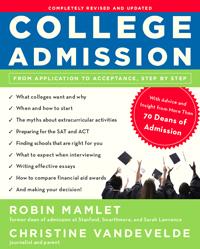Your Step-by-Step Guide to Filing the FAFSA!
Posted on Mon, 11/03/2014 - 12:12The biggest mistake families make in the college application process is failing to apply for financial aid. The most recent study from the American Council on Education found that 1.8 million students who would have qualified for Federal financial aid failed to apply for aid. Last year, the federal government had more than $150 billion in federal aid for students who qualify.
So even if you think you won't qualify, it may be worth it to apply. You're not alone. 85% of full-time students at four-year colleges receive some form of federal aid.
Yet applying for financial aid can be one of the most confusing and daunting steps in the college application process. Well, here's help! Financial aid expert Mark Kantrowitz and his coauthor David Levy have made their bestselling 250-page book, Filing the FAFSA, The Edvisors Guide to Completing the Free Application for Federal Student Aid, available for free download at http://www.edvisors.com/fafsa/book/direct/.















